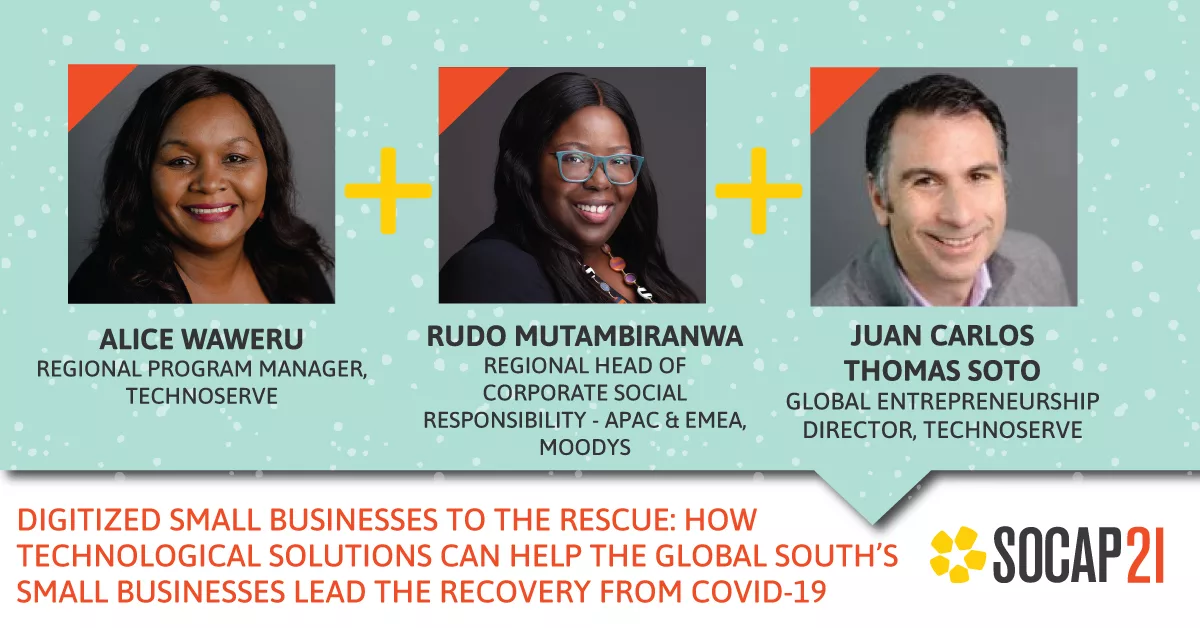Social entrepreneurs and their small businesses play a critical role for local economies and communities across the Global South as an essential source of employment and basic goods and services for vulnerable populations. As they faced new barriers and challenges during the COVID-19 pandemic, many of these businesses have adopted new technologies and accelerated the digital revolution.
During the SOCAP21 session Digitized Small Businesses to the Rescue, panelists discussed what this rapid shift might mean for the future of small businesses and how the broader ecosystem can support and facilitate the digital revolution through social entrepreneurship. Juan Carlos Thomas Soto, Global Entrepreneurship Director at TechnoServe, said small businesses are key for an inclusive economic recovery from COVID-19, as they represent more than 70% of employment worldwide and half of the GDP. “It’s a very harsh picture for micro and small businesses. But a silver lining is that entrepreneurs all over the world have adapted,” he said. “One of the most important adaptations has been the adoption of technology, and we have seen that in TechnoServe programs around the world.”
His colleague Alice Waweru, Regional Program Manager at TechnoServe, supports the growth of small businesses in East Africa, where stay-at-home orders and other restrictions issued early in the pandemic impacted small neighborhood shops that provide about 80% of consumer goods. “They are communities that are usually not served by big retailers. So these are the outlets that literally bring the essential foods and services right to the community’s doorsteps,” Waweru said. “A lot of them experienced broken value chains because of the disruptions of the pandemic. They also saw a significant loss of customers coming to their shops … and a huge decline of sales.”
That’s where TechnoServe stepped in to spotlight new, digital technology that could help these social entrepreneurs and their businesses continue to connect with customers and enhance their practices, she said. “Entrepreneurs are using technology and apps to track sales … helping them to strengthen their record-keeping processes, which help them make better business decisions,” Waweru said, noting that TechnoServe also adapted its practices to better serve its clients. “It’s not only using digital technology … but even as an organization we had to figure out how to make our operations digital to reach entrepreneurs better.”
One of TechnoServe’s partners in this work is Moody’s, where Rudo Mutambiranwa is Regional Head of Corporate Social Responsibility. She shared highlights from some of Moody’s research in this area showing how technology and the digital revolution can help spur productivity by speeding the time from invention to production, create new types of work by automating repetitive tasks, and allow governments to operate more effectively and better target their services.
“The adoption of digital technologies has accelerated by several years,” Mutambiranwa said. “The surveys are showing us that from a consumer’s perspective, the adoption of digital technologies has accelerated, and even more so because of the pandemic.”
Digital technology has allowed forward-looking social entrepreneurs to overcome some of the challenges of working within emerging markets, she said. “Digitization provides an opportunity for innovation and ultimately to address a massive unmet demand.”
Watch ‘Digitized Small Businesses to the Rescue: How Technological Solutions Can Help the Global South’s Small Businesses Lead the Recovery from COVID-19‘
Speakers:
Alice Waweru, Regional Program Manager, TechnoServe
Rudo Mutambiranwa, Regional Head of Corporate Social Responsibility, APAC & EMEA, Moody’s
Juan Carlos Thomas Soto, Global Entrepreneurship Director, TechnoServe






